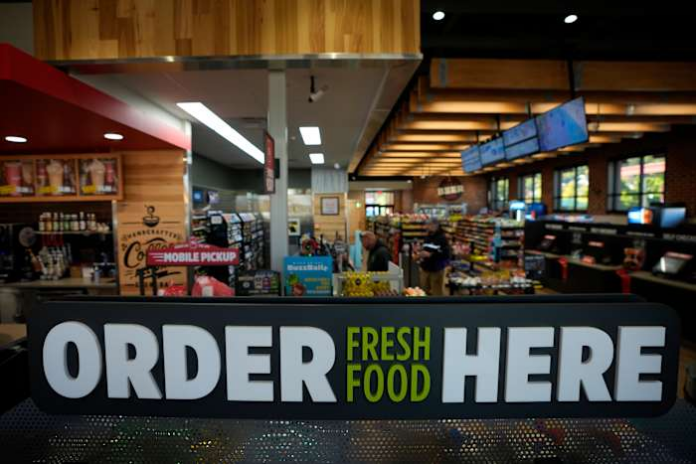NEW YORK – Americans who think of petrified hot dogs, frozen burritos and salty snacks when they imagine getting food at a gas station or truck stop may be pleasantly surprised during their next road trip: U.S. convenience stores are offering them more and better — though not necessarily healthier — choices.
From 7-Eleven to regional chains like QuikTrip, the operators of c-stores, as they’re known in the trade, are looking overseas for grab-and-go inspiration, adding sit-down seating at some locations, expanding their coffee menus to rival Starbucks and experimenting with made-to-order meals for busy families.
Recommended Videos
The moves are happening as convenience stores seek ways to offset slowing sales of cigarettes, maps and soft drinks. By tempting customers’ palates with fresh deli sandwiches and build-your-own burgers, the humble food marts want to become an alternative to fast-food restaurants for busy Americans who crave easy, interesting and less expensive eating options.
“It has been a decades-long journey to go from food that was perceived as desperation to destination,” Jeff Lenard, vice president of strategic industry initiatives for the National Association of Convenience Stores, said.
Once known for breakfast and lunch, convenience chains like Wawa, with more than 1,000 East Coast locations, as well as small operators like York, Pennsylvania-based Rutter’s, have moved into dinner time with soup, chicken and fish dishes. Rutter’s, which operates 90 stores, plans a new store format with expanded seating as it adds 50 new locations in the next five years.
Casey’s General Stores, the nation’s third-largest convenience store operator with 2,500 outlets mostly in the Midwest and the South, introduced warm chicken, pork and hamburger sandwiches on brioche-style buns this year. The company, already known for serving pizza that customers enjoy, created a limited-time menu that included pies and sliders made with smoked pulled pork, barbecue sauce and pickles.
“We really are approaching this like a restaurant as we always have, but more so now,” Carrie Stojack, the Iowa-based chain’s vice president of brand and strategic insights, said. “Prices have gotten really high. So what’s happening is that convenience stores are becoming a real viable option for guests.”
In keeping with their quest, convenience stores are expanding delivery services to build on a customer base they found during the COVID-19 pandemic. 7-Eleven plans to take its 7Now delivery app nationwide, allowing users to have pizza, the chain’s signature Slurpees and thousands of other items brought to their doors.
The nation’s largest convenience store chain, owned by Japanese company Seven & i Holdings, offers select Japanese items like chicken teriyaki, rice balls, miso ramen and sweet chili crisp wings at some U.S. locations and at its recently acquired Speedway and Stripes stores. Visitors to Japan and Hawaii often respond with envy and astonishment when they taste what’s on offer at a 7-Eleven in Tokyo or Honolulu.
The chain’s North American subsidiary said it works with some of the same food manufacturers and commissaries that serve Seven-Eleven Japan. That includes Warabeya, which is expanding its U.S operations to help deliver fresh food to stores and provide an assortment of offerings to suit regional tastes.
“Our team draws inspiration from around the world to introduce new items like mangonada donuts with Tajín, barbecue pork sliders, chicken curry bowls and everything breakfast sandwiches,



